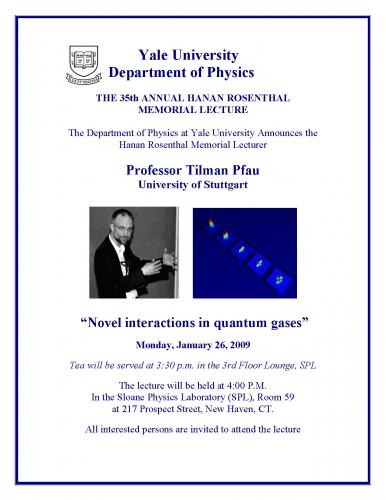
The Yale Physics 35th Hanan Rosenthal Memorial Lecture was given January 26, 2009 by Tilman Pfau, Universität Stuttgart, Germany.
Monday, January 26, 2009 - Novel interactions in quantum gases
Interactions among atoms in quantum gases make them a model system for many branches of physics including condensed matter, and nonlinear dynamics. So far all the impressive phenomena (like superfluidity, soliton and vortex formation, BEC-BCS crossover etc.) in atomic Bose and Fermi gases are caused by an isotropic contact interaction, originating from s-wave scattering off the van der Waals potential.
Here we report on the first realization of a purely dipolar quantum gas, where the long-range and anisotropic interaction between magnetic chromium atoms is determining the physical properties. To generate a dipolar quantum gas we tune the remaining contact interaction to zero via a Feshbach resonance. Dipolar gases exhibit characteristic instabilities due to the attractive part of the interaction, which we studied systematically. The dipolar collapse of a BEC shows the characteristic d-wave symmetry of the dipolar interaction.
We also briefly report on our experiments on interacting ultracold Rydberg atoms excited from a Rb BEC. Universal scaling behaviour due to an underlying quantum phase transition is observed. Here the long-range strong repulsive van der Waals interaction is responsible for novel many-body physics.
The Hanan Rosenthal Memorial Lecture was established in honor of physicist Hanan Rosenthal, a brilliant graduate student at Columbia University and instructor at Yale. This annual lecture in atomic physics, Rosenthal’s field, is given by a distinguished leader in the field. Originally, the lecture series alternated between Columbia and Yale, which were both significant in Hanan Rosenthal’s career; in recent years, the lecture has been held only at Yale University.